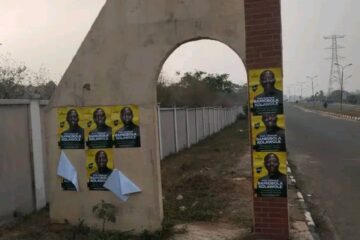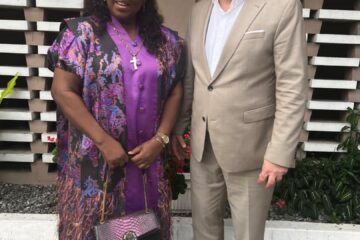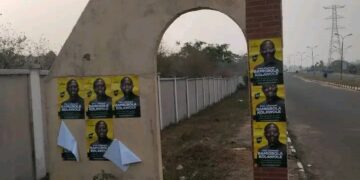EDUCATI
By Tolulope Zechariah

Following a recent visit to Global Wealth University (GWU), Togo, a prominent Nigerian journalist has come forward with strong commendations for the institution, emphasizing its authenticity and adherence to high educational standards. This visit transpired at a crucial time, as concerns have been mounting among Nigerian parents, guardians, and prospective students regarding the legitimacy of some foreign universities operating in West Africa. The journalist’s firsthand observations and experiences at GWU serve to put these fears to rest, offering reassurance that the institution is both genuine and committed to maintaining the educational regulations set forth by the Togolese government.

Global Wealth University – A Beacon of Quality Education

During the visit, the journalist was notably impressed by the academic environment and the rigorous standards upheld by Global Wealth University. “Global Wealth University is not a scam,” the journalist confidently stated. “The institution not only complies with the stringent rules and regulations of the Togolese government but also demonstrates a profound commitment to providing students with a world-class education. From the quality of the faculty to the infrastructure, everything at GWU speaks to its dedication to academic excellence.”

The journalist’s report is particularly timely, as it addresses the growing skepticism surrounding foreign universities, especially in regions where regulatory oversight might be perceived as lax. By highlighting GWU’s adherence to local laws and its operational transparency, the journalist provides much-needed assurance to those considering enrolling in the university.
Economic Challenges- The Devaluation of the Naira:
However, the journey to Togo was not without its challenges, particularly on the economic front. The ongoing devaluation of the Nigerian naira has created significant financial hurdles for Nigerians studying or doing business abroad. The journalist recounted a personal experience where 310,000 naira was exchanged for only 117,000 CFA, a stark reminder of the naira’s weakened purchasing power. Later, when exchanging an additional 113,000 naira, only 42,600 CFA was received.
“This situation is a harsh reality for many Nigerians,” the journalist lamented. “The devaluation of the naira has made everything more expensive, from tuition fees to basic necessities. It’s distressing to think that as one of Africa’s largest economies, we’re struggling so much with currency instability.”
The impact of this devaluation extends beyond the individual to the broader economic landscape, affecting how Nigerians perceive their country’s standing on the continent. The journalist reflected on this, questioning how Nigeria, often hailed as the “Giant of Africa,” has arrived at such an economically precarious position.
Border Experiences – Extortion and Bureaucratic Hurdles:
Another significant challenge encountered during the trip was the extortion and bureaucratic inefficiencies at the border. The journalist detailed a troubling experience with government officials who demanded payments for various unnecessary services, including passport stamping and yellow card verification. “These officials were relentless,” the journalist explained. “They collected money at every turn, from stamping our passports to issuing yellow card stamps, even though we had all our documents in order. This level of corruption is unacceptable.
Such experiences are not only frustrating but also paint a bleak picture of the state of governance and
transparency in cross-border travel within the region. The journalist’s account serves as a call to action for reforms that would ease the burden on travelers and restore dignity to the process.
Observations in Togo – a study in contrast:
Despite these challenges, the journalist’s observations in Togo were largely positive, highlighting several areas where the country seems to be outperforming Nigeria. Security, for instance, was noted to be commendable. “Security is tight to some extent,” the journalist observed. “Every two or three miles, you can spot a police officer discreetly monitoring the area. This presence instills a sense of safety, something that is sorely lacking in many parts of Nigeria.”
The discipline of Togo’s citizens was also striking. The journalist noted how diligently they adhered to traffic regulations, with motorcyclists and their passengers consistently wearing helmets—a practice that is often neglected in Nigeria. “It was refreshing to see how well-coordinated the citizens were,” the journalist remarked. “They respect traffic lights, and safety measures are strictly followed. It’s a stark contrast to what we’re used to in Nigeria.”
The journalist was also impressed by the state of infrastructure in Togo, particularly the quality of the roads and the reliability of electricity. “The roads are 100% top-notch,” the journalist reported. “And as for electricity, it’s almost unbelievable how reliable it is. In a month, they might turn off the power once or twice, and only for a couple of minutes before it’s restored. This level of infrastructure is something we can only dream of in Nigeria.”
Hotel accommodations were similarly impressive, though the journalist noted that the devaluation of the naira made them more expensive than they would otherwise be. “The hotel was nice, with all the amenities you could want,” the journalist noted. “But the cost, when converted from naira, is far higher than it should be. If our currency had value, things would be different.”
A Call for Reflection and Action:
The journalist’s visit to Global Wealth University in Togo ultimately serves as a powerful narrative on multiple levels. It reassures Nigerian parents, guardians, and students that GWU is a legitimate and high-quality institution, worthy of their trust and investment. However, it also underscores the broader economic and governance challenges facing Nigeria. The devaluation of the naira and the pervasive corruption at the border are symptomatic of deeper issues that need to be addressed if Nigeria is to reclaim its position as the “Giant of Africa.”
The journalist concluded, “We have much to learn from our neighbors in Togo, especially in terms of governance, discipline, and infrastructure. It’s time for Nigeria to take a hard look at itself and make the necessary changes. Our future depends on it.”





















The institution is doing well
Dieser Ort ist nicht nur ein Spielbank; er spiegelt Bremens Entwicklung von einem Schlüsselspieler im
maritimen Handel zu einem lebendigen Unterhaltungszentrum wider.
Mit seiner eleganten Mischung aus traditionellen Tischspielen und modernen Spielautomaten verspricht dieser Ort eine Nacht voller Aufregung.
Die Schlachte bietet zwischen Martinikirche und Überseestadt darüber hinaus Theater
und Varieté, Weser- und Hafenrundfahrten, Übernachtungen am und auf
dem Wasser sowie Konzerte und Veranstaltungen. Im Automatensaal ist es noch entspannter in Bezug auf die Kleiderordnung, denn da können Gäste in lockerer Freizeitkleidung spielen. In der Spielbank Bremen an den Tischen können Fans des Rouletts die amerikanische Variante spielen und zwar mit einem Mindesteinsatz von nur einem Euro.
An den Spielautomaten kann man schon mit einem Cent Mindesteinsatz spielen und an der Multi-Rouletteanlage mit 12 Touchscreen Monitoren bereits ab 50 Cent.
Das meist gespielte Karten-Glücksspiel der internationalen Spielbanken. In Sachen Service und Rahmenangebote liefert das Unternehmen permanent
neue Ideen und kundenfreundliche Programme, wovon letztlich auch der
Standort an der Bremer Schlachte profitiert.
Des Weiteren ist das Unternehmen für den Lotto- und Totospielbetrieb in Nordrhein-Westfalen zuständig.
Mit den Spielbanken in Duisburg und Dortmund besitzt
Westspiel zwei der größten und umsatzstärksten Casinos in Deutschland.
In unmittelbarer Nähe befinden sich das Parkhaus “Kurze Wallfahrt 5 Parking” und das “BREPARKhaus Pressehaus”.
Das umfangreiche Getränkeangebot beinhaltet neben warmen Getränken auch ganze 10 Biersorten (drei davon vom Fass), Spirituosen, Weiß- und Rotweine,
Champagner & Sekt, Cocktails und nicht-alkoholische Getränke.
Es gibt Veranstaltungen, die so gut sind, dass sie immer
wieder stattfinden. Das Casino Bremen fügt sich nahtlos
in das lebendige Stadtbild Bremens ein und hat den perfekten Platz direkt an der Weser gefunden.
Das unter Denkmalschutz stehende Gebäude lässt nicht erahnen, dass sich im Inneren eine moderne und elegante Einrichtung und ein großes Spiel- und Unterhaltungsangebot verbirgt.
References:
https://online-spielhallen.de/ihr-ultimativer-leitfaden-zum-sol-casino-aktionscode/
Canadian National Casino is not just an online gaming platform; it's a treasure trove
of entertainment. 🎲🌟 With such a diverse range of software providers, National Casino delivers an unparalleled gambling experience.
National Casino is not just a platform for exciting gameplay; it's a showcase of craftsmanship from over 120 of
the industry's most renowned software developers.
We honestly prefer the live chat option more because it’s quicker.
The majority of people seem to be satisfied with their time on the website, which is a good sign of fairness and legitimacy.
That’s the beauty of the no app approach – this legal casino simply works on nearly anything.
References:
https://blackcoin.co/welcome-to-wolf-winner-casino-play-win-big/
online betting with paypal winnersbet
References:
https://bengalhive.com/employer/best-paypal-casinos-2025-best-casinos-accepting-paypal
online casino roulette paypal
References:
http://urikukaksa.com/